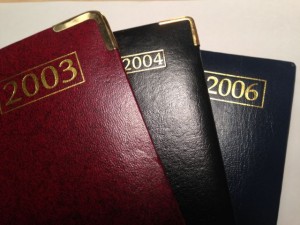FOIMan looks at whether politicians’ diaries are fair game under FOI.

Not long after FOI came into force in the UK I returned to the office from an external meeting to find my boss looking a little frazzled. This was never good news at the best of times. Tentatively I enquired as to what had been going on. It turned out that the Evening Standard had published a two page splash on Ken Livingstone’s diary.
Splash, as it turned out, was the right word. It included details of the time he set aside for a morning swim. No cuts were in evidence, other than the haircut that was also reported. Someone at the GLA had disclosed the entirety of the Mayor of London’s diary under FOI. The Mayor’s adviser, furious, had apparently hauled the Head of Law out of a meeting to demand an explanation. The Head of Law had in turn tried to find me to find out what had happened, and had instead found my boss, which explained her state on my return. Thankfully, by the time I returned it had already been established that someone in the Mayor’s Office had – against procedure and advice – sent out the whole diary without asking for advice from me as to what exemptions could be applied to it. Phew.
Over time, I came to realise that diaries were a sensitive subject. And a decision by the First Tier Information Tribunal this week has reinforced that impression.
The appeal concerned a request for Andrew Lansley’s ministerial diary at the time that he was Health Secretary. The Department of Health had released some information but withheld much of the diary under a range of exemptions and other means. The Information Commissioner had ordered that much of the information should be disclosed.
The decision of the Tribunal contains some interesting gems. My particular favourite is the argument by the Department that diary entries relating to party political meetings immediately cease to be held by the Department after the meeting has been held. It’s one of those tortuous metaphysical contortions that only government departments appear to be capable of. The Tribunal unsurprisingly gave this short shrift.
Another argument advanced by the Department was that the Tribunal should defer to its arguments as to the public interest in withholding information under section 35 of FOIA (the exemption for policy formulation). In other words that there was a strong public interest in just accepting the Government’s version of events over anyone else’s. If this approach were to prevail, it would effectively be game over for any future attempt to overturn the use of section 35. Thankfully, the Tribunal was again dismissive of this argument.
I was surprised to realise that this decision was the first concerning disclosure of a ministerial diary at the Tribunal level. Given this, it’s a useful one for all FOI Officers, especially those who work in organisations where politicians exercise an executive role. The key learning points from this case are that:
- there’s no blanket rule that Ministers’ diaries can’t be disclosed
- instead, public bodies need to methodically analyse the contents and identify what exemptions might apply to each entry
- entries covering personal and party political appointments are held – they might well be exempt as personal information for example, but they are held under the definition at s.3
- regular pro-active publication of the Minister’s meetings and appointments does not satisfy the public interest in disclosure if it excludes certain appointments – for example in this case, quarterly publication of these details excluded video conferences and telephone calls which appeared in the diary.
For a more detailed analysis of the decision, including discussion of the decision’s comments on aggregation of public interest arguments, see Tim Pitt-Payne’s article on 11KBW’s Panopticon Blog.

![Peeps [at the] diary](https://www.foiman.com/wp-content/uploads/2019/12/notebookthoughts-red60v2.jpg)